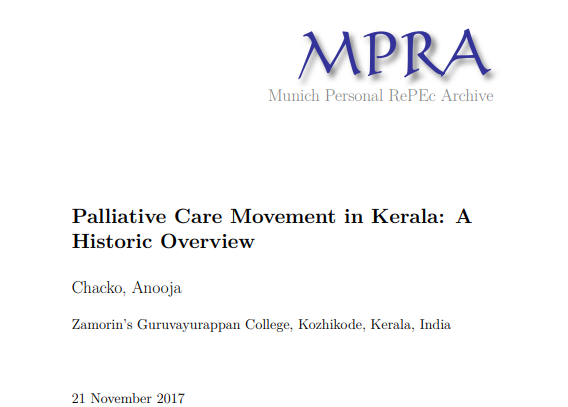Review of Community-based Health Care Movement and Palliative Care in Kerala
Palliative care is a relatively new concept in the Indian healthcare landscape, arising from the need to address the challenges posed by changing family structures, increasing life expectancy, and evolving epidemiological trends. In this context, Kerala’s community-based palliative care movement has emerged as a pioneering model that combines decentralized public health delivery with active community participation. This abstract reviews the palliative care policy of Kerala, highlighting its innovative features, socio-economic impact, and broader implications for public health in India.
Kerala’s palliative care model is unique due to its emphasis on community-based interventions, economic sustainability, and integration with local self-governments. Initially focused on end-of-life care and pain management, the scope of palliative care has expanded to address the bio-psychosocial and spiritual needs of patients and families. This approach has garnered global recognition, including acknowledgment by the World Health Organization (WHO), for its effectiveness in low-resource settings. The Neighborhood Network in Palliative Care (NNPC) is a notable example, demonstrating how trained community caregivers, supported by medical professionals, can deliver quality care at the grassroots level.
The Palliative Care Policy of Kerala (2008) marked a significant milestone by formalizing the government’s role in supporting and expanding these community-driven initiatives. The policy emphasizes decentralization of health care, collaboration with civil society organizations, and capacity building among healthcare professionals and volunteers. Furthermore, it underscores the importance of ensuring affordable access to essential drugs and equipment, such as oral morphine for pain relief, which remains a challenge in many parts of India. By mandating financial support from Local Self-Government Institutions (LSGIs) and promoting social entrepreneurship, the policy ensures the sustainability of palliative care services.
Kerala’s approach is particularly relevant in addressing the healthcare needs of vulnerable populations, including the elderly, chronically ill, and economically disadvantaged. The state’s decentralized model has led to the establishment of palliative care services in over 1,000 panchayats by 2013, reducing regional disparities in service delivery. Training programs for professionals and volunteers, such as the Basic Certificate Course in Palliative Medicine and Nursing, have further strengthened the workforce. However, challenges persist, including gaps in drug policy implementation and the need for specialized medical training to enhance the quality of care.
Studies have shown that Kerala’s palliative care movement has positively impacted health indicators, contributing to the state’s reputation as a leader in public health. Despite its success, the movement underscores the importance of community participation and voluntarism, which are essential for replicating this model in other states. The Kerala experience highlights that mere policy formulation is insufficient; effective implementation and community sensitization are critical for sustained impact.
In conclusion, Kerala’s community-based palliative care model and policy represent a transformative approach to public health, addressing not only medical but also socio-economic and psychological dimensions of care. This model offers valuable insights for developing inclusive and sustainable healthcare systems in India and beyond, particularly in resource-limited settings.




Comments
Post a Comment